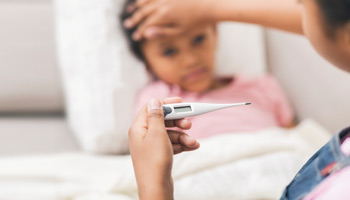HOW CAN WE HELP YOU? Call 1-800-TRY-CHOP
In This Section
CHOP Researchers Awarded NIH Emergency Grant to Study MIS-C Diagnostics

CHOP researchers receive NIH emergency funding to study new diagnostic strategies for multi-system inflammatory syndrome in children (MIS-C).
New strategies for diagnosis of multi-system inflammatory syndrome in children (MIS-C) with fever are urgently needed. The problem, explained Audrey Odom John, MD, PhD, chief of Infectious Diseases at Children’s Hospital of Philadelphia, is when children first present with MIS-C, a rare but severe after-result of COVID-19, some of them can just have fever. They get sent home from the Emergency Department because it looks like a routine viral infection.
“But then they come back — potentially in shock — and needing to be admitted to the ICU,” Dr. Odom John said. “We don’t know whether early treatment can prevent progression to shock. And in part, we can’t yet study this because we aren’t certain early on which child has MIS-C and which doesn’t. This is a stressful thing for ED physicians and for families.”
Diagnostic relief could soon be on the way though, as Dr. Odom John and her investigative team have been awarded one of only eight research grants to study MIS-C from the NIH’s Rapid Acceleration of Diagnostics Radical (RADx-rad) initiative, which was created to support innovative research to develop novel or nontraditional approaches to identify and characterize the spectrum of SARS CoV-2 associated illness, including MIS-C.
Led by Dr. Odom John and Hamid Bassiri, MD, PhD, the CHOP collaborative research team working on the grant, “Diagnosis of MIS-C in febrile children," includes Fran Balamuth, MD, PhD; Ed Behrens, MD, PhD; Jeff Gerber, MD, PhD; Aaron Masino, PhD; Dave Teachey, MD; and Laura Vella, MD, PhD.
By leveraging Dr. Odom John’s knowledge and expertise in pediatric biomarker discovery, the team will examine whether MIS-C causes changes in metabolites found in the breath, urine, or saliva of children. They hope to integrate these discovery studies with clinical and immunological profiling to develop and validate a novel and much-needed MIS-C diagnostic, which could have a major impact on care of children with fever in the post-COVID era.
“We hope that our studies will not only improve diagnosis of MIS-C,” Dr. Odom John said, “but will also teach us lessons that can help us diagnose other causes of fever in children. By focusing on samples that are easy to get from children, like breath, we hope that our diagnostics will help clinicians who care for children both in the United States and in more resource-limited parts of the world as well.”